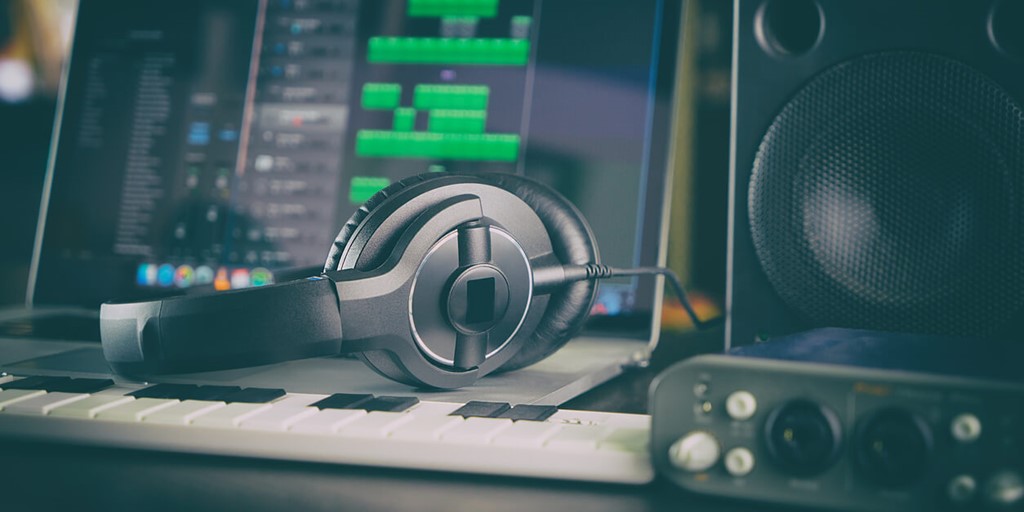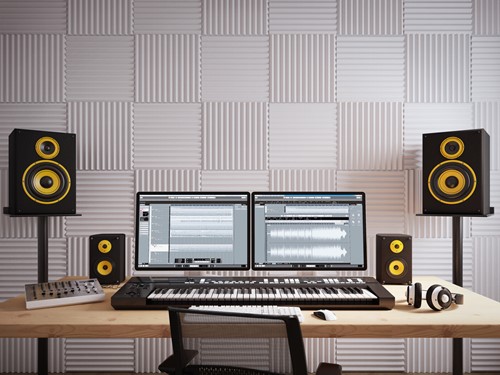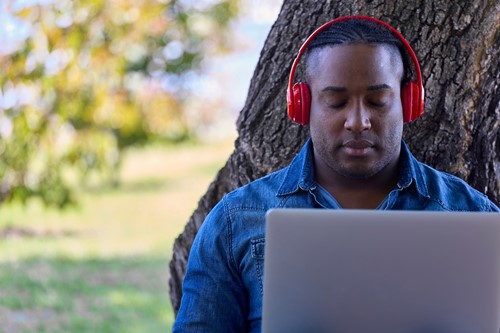

Are you a DJ or musician that wants to try your hand at music production? Or do you perhaps just want to know if this could possibly be a route for you?
Here we cover 7 music production tips for beginners, so you know what the process involves and how to start producing your own songs.
What is music production?
Music production is a holistic term for the process of writing, recording, and mastering music for public release.
Songwriters and musicians can be dubbed ‘music producers’ as they’re heavily involved in this process.
But this term is most often associated with those involved in the mastering stage, where digital tools are used to manipulate or fine-tune the sound.
Music producers in commercial settings can often be compared to film directors, as they take on more of a leadership role and guide the musicians in line with their artistic vision.
However, there are a lot of bedroom musicians or independent artists producing music from their home studios thanks to digital tools and software, making it more accessible than ever.
So, if you want to learn more about the technical side of music production, it’s easy to get a taste for it without necessarily investing too much time and money.
7 music production tips for beginners
1. Get to know what’s out there
Perhaps the easiest way to understand where you and your sound fit into the music production world is to see what’s already out there. This is especially important if you want to turn your hobby into a career.
These days, many independent music producers are rising in popularity through the social media platform TikTok.
Take SeshNolan, for example. He’s a 20-year-old producer with over 500k views on this video, featuring his spin on a Migos track.
Or look at Jai Beats, an 18-year-old multi-platform producer who has worked with artists such as Travis Scott, Rod Wave, and Fetty Wap. He credits his growing online presence for allowing him to get many of these opportunities.
Alongside researching and listening to huge producers in pop culture, such as DJ Khaled, Dr Dre and Timbaland, for example, it’s also good to get a feel for what up-and-coming artists are doing.
Listening to producers with more niche sounds, such as John Feldmann or Mark Trombino (well-known for defining the pop punk and emo music genres), is another idea to help you grow as an artist.
So, one of our biggest music production tips for beginners is to use a melting pot of different sounds for inspiration—this allows you to discover more about your tastes and develop your sound.
Related: On TikTok, music producers are moving from the background to the spotlight
2. Pick up the essential music production gear

When it comes to producing music for beginners, it’s easy to get lost in the heaps of online advice and feel pressured to invest in a ton of expensive gear.
But there’s no need to break the bank, especially when starting out.
There are plenty of free options, and thanks to technological advancements of the past few years, you can even use your smartphone to produce if you’re on a limited budget.
Here are the essentials:
- a production device—you can use your smartphone if you’re creative, but laptops or desktop computers have more powerful operating systems and sophisticated tools for producing quality sounds
- DAW (digital audio workstation)—production software such as Logic Pro, FL Studio, and GarageBand (a great free alternative) is vital for mixing and mastering music
- monitoring equipment—a good set of monitoring speakers will take your tracks to a new level, but if you have limitations due to space or budget, a quality pair of headphones is sufficient
These are the essential pieces of music production gear for beginners, but there’s always room for expansion.
If you have the budget, you may want to invest in a controller or virtual instrument software for a more professional sound.
Or, if you’re recording live instruments or vocal sessions, audio interfaces or microphones designed for vocal production can provide a much more authentic result.
You may also consider looking into sampling, as several high-profile producers have done successfully.
Luckily, many free samples are legal to use online, but you must ensure you look in the right places. Here’s a step-by-step guide to sampling to help you out.
3. Set up a comfortable studio space
One of the most invaluable music production tips for beginners is to create a designated space to work in.
This doesn’t necessarily mean creating a full-blown studio in your home. It’s surprising what you can do with limited space and a tight budget—this guide on building a home studio (on a budget) is helpful if you’re starting out.
Even if you can only work from a corner in your bedroom, you should ensure it’s a comfortable and inspiring space that keeps you free from distraction and allows you to do your best work.
In its 2017 report Creativity, Work, and the Physical Environment, Steelcase states—‘intentionally designed space has the power to drive attitudes, behaviours and levels of performance that people and organizations need to thrive.’
A quick Google will reveal this idea is backed up by many notable creatives, so it’s not something you want to overlook if you’re serious about your work.
4. Get used to closing your eyes

If you place too much trust in the visual aids from your software, you can lose the authenticity of the production process—crafting the music itself.
Avoid this beginner’s mistake by shutting your laptop or closing your eyes and tuning into the sounds you’re working with.
Developing this skill will ultimately make you a better producer and mean that you stand out against the crowd of others who sometimes forget to go back to the roots of creating music.
Related: Home DJ set ups—the ultimate guide
5. Be consistent in your practice
No amount of software and expensive sound equipment is going to make you a great producer.
With that in mind, one of our biggest music production tips for beginners is to develop a consistent creative practice. This will help you build your skills and experience and give you a sharper ear for good music.
Surround yourself with all things music production. Listen to established artists, listen to work from up-and-coming producers, and use different techniques within your go-to DAW—integrating your work into your day-to-day life is the best way to improve.
6. Always be learning

Following our previous point, our next tip on producing music for beginners is to always continue learning.
You may feel eager to get on your DAW in every session and just practice, which is completely understandable.
But suppose you’re new to music production and don’t have prior knowledge on the topic. In that case, you may want to invest time in further learning to expand your industry knowledge and better understand the process behind creating quality sounds.
Even just learning the basics of music theory alongside your time in the studio is a good start and will have huge benefits in the long run.
You may also want to complete online courses in music production in areas you’re unfamiliar with or want to learn more about. This is one of the fastest ways to build in your skillset from the comfort of your own home or studio.
At the very least, you should look out for interesting elements in tracks from artists you’re inspired by and have a go at reproducing those sounds. This is a fun and motivational way of getting your production skills to a high standard.
7. Seek feedback
We don’t mean asking your parents or friends for their opinion on your work (unless they’re industry professionals).
Seeking constructive feedback from talented, trustworthy sources or fans of the genre you’re working in is one of our most important music production tips for beginners.
There’s no better way to understand how well your work resonates with your intended audience and how it weighs up against what’s already out there.
You could contact artists or studios directly, but the fastest way to get feedback is to consistently post your work online on a platform such as Instagram or TikTok, build up a following, and ask your audience to let you know what they think.
We mentioned SeshNolan earlier. He regularly asks his viewers for their opinion on his work and responds to comments to engage with them.
The important thing to remember is that there are technically no ‘right’ or ‘wrong’ opinions—most are completely subjective. But if a few people say the same thing, you may want to listen and implement changes if you feel this will improve your music.
Specialist music insurance through Insure4Music
Whether you’re a live DJ, a songwriter, or work mostly in the studio, you might want to protect your instruments or sound equipment through specialist insurance.
With Insure4Music, you can cover your gear against theft, loss, and damage both in and out of your home. You can also opt to include Public Liability cover, which is often a requirement for performing live at venues.
Click here to learn more about how we can help or click the button below to get an instant online quote.

